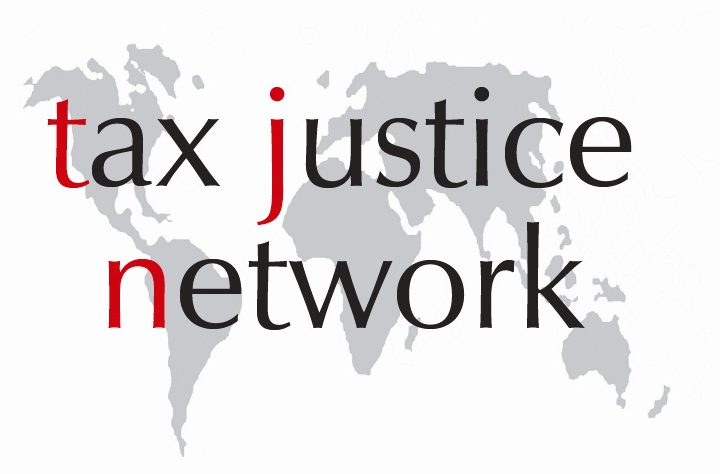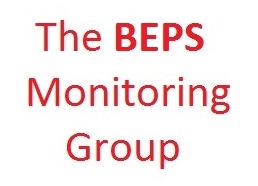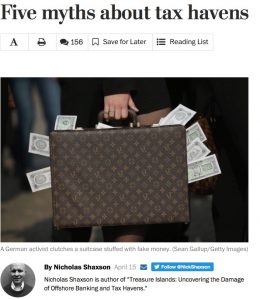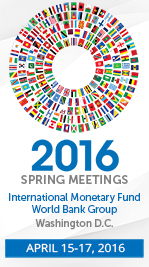On Sunday, the International Monetary Fund will host a major event on tax. The IMF, of course, would love to take some of the OECD’s space as the go-to organisation on tax for the G8 (G7) and G20 groups of countries.
Earlier this week, a UK member of parliament asked both Christine Lagarde and Jim Yong Kim (the heads of the IMF and World Bank, respectively) for their views on proposals for an intergovernmental tax body – and their answers were surprisingly poorly informed. That might not matter if this wasn’t a live policy issue; but it is, and it does.
The panel, which will be webcast live, will include two firm supporters of an intergovernmental tax body: Joseph Stiglitz, a member of the Independent Commission for Reform of International Corporate Taxation; and Winnie Byanyima of Oxfam.
Christine Lagarde will also speak; and so we thought it might be useful to flag in advance three main areas in which the IMF and World Bank heads seemed confused. (Quotes are taken from this handy Guardian piece.)
1. An intergovernmental tax body involves ‘thinking outside the box’
‘Christine Lagarde [said she was unfamiliar with the proposal] but acknowledged: “I think it’s an area where we all have to think outside the box… thinking outside the box might be of great interest.”’
International policy discussions are continually guilty of forgetting their own past. Tax in particular has been neglected as a development policy issue for decades, and only in the last few years has that started to unwind – so some ‘new’ ideas turn out to have been considered in the 1960s or 1970s, for example.
The idea of an intergovernmental tax body has long roots, but was most famously promoted by Vito Tanzi through the 1990s and since. Who is Vito Tanzi, you ask? No less than the long-standing and well-respected then head of the tax unit at… the IMF. From there, it was adopted as a central recommendation of the Zedillo panel, which underpinned the Monterrey Consensus on Financing for Development that was intended to give the Millennium Development Goals some basis beyond aid.
But even if you’d forgotten that recent history, you’d have to have taken the first half of 2015 on holiday in order not to have seen that the discussions leading up to and at the Addis Financing for Development summit in July were dominated by a single issue: yes, the question of whether to create an intergovernmental tax body. (OECD members led by the UK and US were finally able, albeit at a substantial cost in political credibility, to block a solid G77 and wider majority in favour of such a body.)
2. An intergovernmental tax body will be a drain on aid
‘Jim Yong Kim… was even more sceptical[.] “If you’re going to add another UN institution it will require some chunk of ODA [official development assistance]… I do not see your parliaments rushing to have a competition to increase taxes and increase your tax base so you can give more aid. I don’t see that happening.”’
The second claim concerns resourcing. On the one hand, it’s certainly true that the UN tax committee – the closest thing to an intergovernmental body in practice – is woefully under-funded. For that reason, OECD member states tend to argue that the highly-funded tax team in their organisation should lead any technical work.
But of course tax decisions at the international level are political more than they are technical, as distributional impacts come to the fore and are bargained over – so having decisions taken in the confines of the rich country’s club is a recipe for decisions that favour members over non-members. Not unrelatedly, recall that the split over whether or not to agree an intergovernmental body at Addis looked a lot like OECD members versus the rest of the world. Hmm.
Anyway, the point made was about aid. The OECD is currently inviting developing countries to join one of its fora, on two conditions: first, that they sign up to everything just agreed (largely without them) in the Base Erosion and Profit Shifting initiative; and second, that they pay for the privilege. An outsider would suggest that the technical budget of the OECD, plus a highly progressive sliding scale of fees, would be sufficient to get a new body going fairly well.
And in the medium-term or sooner, investment in such a body is likely to yield substantial returns – from even a small dent in multinational profit-shifting (estimated to be around 25% of global profits) and/or undeclared offshore assets (where the low-end estimate is around 8% of private household wealth).
There are very good reasons to invest aid directly in public services such as education and health, and a good chance in many cases of eventual economic returns through higher GDP. But we also have evidence that governments perform better when tax is the main source of revenue, and that a higher proportion of tax than aid tends to be spent on those public services – so the priority has to be to support national tax-raising efforts.
This means that it’s likely to be a highly efficient use of a small fraction of the global aid budget to support an intergovernmental tax body tasked with improving the international transparency of assets, income streams and profits; and with providing a globally representative space to discuss and agree improvements to international tax rules. Focusing on the potential upfront cost, to the exclusion of the likely return, is myopic to the point of being self-defeating.
3. An intergovernmental tax body is a threat to national sovereignty
Perhaps the most damaging thing said was this from Christine Lagarde:
“[I]f anything, levying taxation is considered as an attribute of sovereignty, and anything that takes away from that is going to be very strongly opposed by many countries in the world, many forces.”
This rests on a fundamental misunderstanding of the proposal, and of the way that international tax currently operates. If decisions about taxes were simply to be given up by national legislatures, to some world tax authority for example, there might be a point. But the entire purpose of the proposal is to return and bolster tax sovereignty at the national level.
Without good information on the offshore assets and income streams of residents, or on the full global operations of multinational companies, national tax authorities are unable to take sovereign decisions over direct taxation – meaning, all too often, that they are unable to achieve either the level of revenues or of progressive reduction in inequality that political preferences would indicate. An intergovernmental body that addresses these issues would bolster sovereignty for the great majority of states.
One group would, however, face a possible threat. At risk would be the sovereign freedom of Panama and others, including many states of the USA, to offer financial secrecy vehicles that undermine taxing rights elsewhere. Most would see the decision here as a clear one. But even here, there would for the first time be a truly representative, global body to take such decisions about the relative merits of protecting different types of sovereignty – rather than the narrow OECD.
Tune in
Perhaps Sunday’s event will see a beautiful consensus emerge – frankly, it’s about time.
The OECD has, arguably, had its chance to show it can provide a forum for truly global discussion and agreement. The failure of the BEPS process to deliver for developing countries above all has surely closed the door on that.
Or else it’s been achieved by the organisation’s current, increasingly laughable inability to name the United States – rather than Panama – as by far the biggest remaining financial centre to refuse to sign up to automatic exchange of tax information.
The US (perhaps still with UK support) retains the power, if not the credibility, to block the creation of an intergovernmental body. But as the US is increasingly seen as the tax haven of choice, for how long?





















